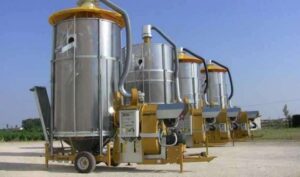
Minister of Agrarian Policy and Food Vitaliy Koval and representatives of the USAID Harvest program handed over the first 10 grain dryers to farmers working in the frontline areas, the press service of the Ministry of Agrarian Policy and Food reported.
“The first 10 grain dryers will benefit more than 100 farmers. This will allow them to increase production, ensure proper drying of grain and sell products with 15-20% added value in the frontline regions,” the minister said.
According to him, the USAID Harvest program will also provide farmers with 7,000 grain sleeves, which will help preserve 1.4 million tons of grain. The initiative is aimed at overcoming the critical shortage of grain storage capacity in Chernihiv, Dnipro, Donetsk, Kharkiv, Kherson, Mykolaiv, Odesa, Sumy and Zaporizhzhia regions and will help about 300 farms with an area of 1,000 to 10,000 hectares.
Koval reminded that during the war, when granaries for long-term storage of grain were destroyed throughout the frontline territory, such sleeves became a real salvation for Ukrainian farmers.
The Minister thanked the Food and Agriculture Organization of the United Nations (FAO) and the United States Agency for International Development (USAID), which, with the financial support of the governments of Canada, Japan and the United States, were able to implement this program.
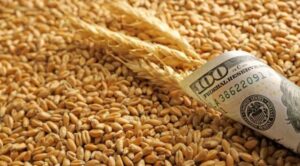
Since the beginning of the 2024-2025 marketing year and as of December 9, Ukraine has exported 18.981 mln tonnes of grains and pulses, of which 606 tonnes were shipped this month, the press service of the Ministry of Agrarian Policy and Food reported, citing data from the State Customs Service of Ukraine.
According to the report, as of December 13 last year, the total shipments amounted to 14.697 mln tonnes, including 1.6 mln tonnes in December.
In terms of crops, since the beginning of the current season, Ukraine has exported 9.115 million tons of wheat (121 thousand tons in December), 1.866 million tons of barley (4 thousand tons), 10.8 thousand tons of rye (0), and 7.684 million tons of corn (475 thousand tons).
The total export of Ukrainian flour since the beginning of the season as of December 9 is estimated at 33.3 thsd tonnes (1.6 thsd tonnes in December), including 30.5 thsd tonnes of wheat (1.5 thsd tonnes).
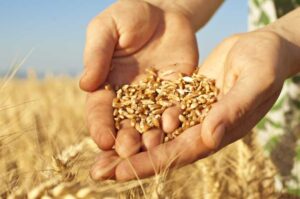
Global cereal production in 2024 will decline by about 0.6% from the previous year to 2,841 million tons, a downward revision since October, but still the second largest production on record, according to the monthly review of the UN Food and Agriculture Organization (FAO).
According to the report, world wheat production in 2024 will be at the level of 2023 and will amount to 789 million tons, while corn production will decline by 1.9% from the previous year to 1,271 million tons due to lower than expected yields in the European Union and the United States.
FAO’s forecast for global rice production in 2024-2025 increased by 0.8% to a record high of 538.8 million tons.
Softer wheat prices in 2025 may prevent the expansion of the area under winter wheat during the sowing campaign, which is being conducted in the Northern hemisphere. Below-normal precipitation in key wheat-growing regions in Russia resulted in low soil moisture levels, which affected planting. In contrast, favorable soil moisture and government support policies, as well as favorable prices, should encourage planting expansion in China and India.
Early signs point to a reduction in corn plantings in Argentina due to dry conditions and the risk of dwarfing disease transmitted by cicadas. In Brazil, the area under corn in 2025 will remain at last year’s level. In South Africa, white corn acreage is expected to increase. This is due to record prices and will compensate for the reduction in the area under yellow corn.
Global grain consumption is projected to increase by 0.6% to 2,859 million tons in the 2024/25 marketing year (MY, July-2024-June-2025), driven by projected growth in rice and wheat consumption as food.
According to FAO’s November forecast, global grain stocks will decrease by 0.7% from their initial level, resulting in a global grain stocks-to-consumption ratio of 30.1% in 2024/25 MY, which is lower than 30.8% in the previous year, but still indicates a “comfortable supply level” on a global scale.
International grain trade for 2024/25 MY is forecast at 484 mln tonnes, which is 4.6% less than in the previous year.
“Global wheat and corn trade volumes are expected to decline, while rice trade is expected to increase,” the report says.
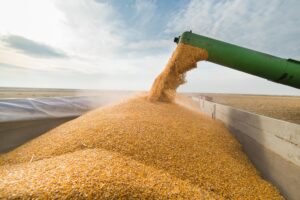
As of December 6, Ukraine exported 18.855 mln tonnes of grains and pulses since the beginning of 2024-2025 marketing year, 480 thsd tonnes of which were shipped since the beginning of the month, the press service of the Ministry of Agrarian Policy and Food reported, citing the data of the State Customs Service.
According to the report, as of the same date last year, the total shipments amounted to 13.723 mln tons, including 626 thsd tonnes in December.
At the same time, in 2024-2025 marketing year, the exports of all major crops are significantly higher than last year. Thus, since the beginning of the current season, Ukraine has exported 9.078 mln tonnes of wheat (6.057 mln tonnes in 2023/24 MY), 1.865 mln tonnes of barley (889 thsd tonnes), 10.8 thsd tonnes of rye (0.9 thsd tonnes), and 7.6 mln tonnes of corn (6.642 mln tonnes).
The total export of Ukrainian flour since the beginning of the season as of December 6 is estimated at 32.8 thsd tonnes (in 2023/24 MY – 51.1 thsd tonnes), including 30 thsd tonnes of wheat (48.8 thsd tonnes).

In 2024, the cost of exporting grain cargo by rail in Ukraine decreased from $21.3/ton to $14-14.5/ton, Valery Tkachev, Deputy Director of Transportation Technology and Commercial Work Department at Ukrzaliznytsia (UZ), wrote on Facebook.
The main reason for the reduction in logistics costs, he said, was the reduction in the cost of using grain wagons.
“Over the course of the year, the cost of using grain wagons decreased from UAH 1688 per day to UAH 280-330 per day, a 5-5.5-fold reduction,” Tkachev emphasized.
According to him, as of November, UZ has a surplus of 5000-7000 grain cars.
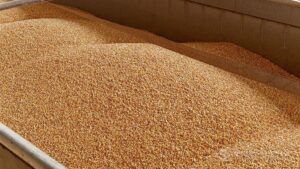
Ukraine has exported 17.978 mln tonnes of grains and pulses since the beginning of 2024-2025 marketing year (MY) as of November 28, of which 3.579 mln tonnes were shipped in November, the press service of the Ministry of Agrarian Policy and Food reported, citing the State Customs Service data.
According to the report, as of November 27, 2023, the total shipments amounted to 12.921 mln tonnes, including 3.681 mln tonnes in November.
The exports of all major crops in 2024-2025 MY are significantly higher than last year. Thus, since the beginning of the current season, Ukraine has exported 8.837 mln tonnes of wheat (5.755 mln tonnes in 2023-2024 MY), 1.856 mln tonnes of barley (870 thsd tonnes), 10.8 thsd tonnes of rye (0.9 thsd tonnes), and 6.976 mln tonnes of corn (6.07 mln tonnes).
The total export of Ukrainian flour since the beginning of the season as of November 28 is estimated at 31.3 thsd tonnes (in 2023-2024 MY – 49.2 thsd tonnes), including 28.6 thsd tonnes of wheat (47.1 thsd tonnes).